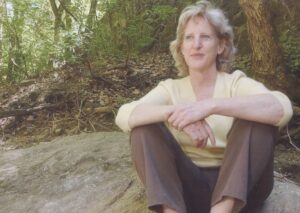I stand here before you today—kosi revayah; my cup is flowing over. I offer these words today in memory of my parents, Fred and Etta who cultivated in me a love of nature, and in memory of Rabbi Daniel Kamesar who kindled a passion for Torah in my heart, and Rabbi Joseph B. Glaser, who took note of me, and adopted me like a father. And I dedicate these words to so many friends, and loved ones who accompanied me on this precipitous journey: to Steve and Laurie who, like their great ancestor Abraham, made their home mine, and to my many ḥevrutah partners, who filled me up with the study of Torah, and to all my teachers at AJR who thought with me and nourished me, and to Steven who kept the home-fires burning and kept loving me, even when I was no where to be found.
One of the really precious things about becoming familiar with Jewish texts is that I begin to hear the echos of ancient words in daily conversation, and feel my life growing in depth and dimensionality. As I thought about what I wanted to share today, I kept hearing in my head Maimonides’ 13 Principles of Faith reverberating through the NPR series called, This I Believe.[1] The NPR series revived a program of the same name hosted by Edward R. Murrow, This I Believe (1951-1955). Weaving these two not so different themes together, here’s where I arrived:
| Contribute a translation | Source (English) |
|---|---|
2. I believe that the earth and its ever expanding diversity of life is a reflection of the infinity, wholeness and interconnectedness of the one God. | |
3. I believe that the best translation for God’s inexpressible name in the Hebrew Bible — yud heh vav heh — is being or existence. God is the One who causes being and is found in reality. | |
4. I believe that the Israelite people are charged to be a blessing to the world: to bring Jewish ideas and practices to the market place of ideas, to bring Torah, which has so often been misunderstood and misrepresented, to the public domain. | |
5. I believe that the world needs Torah. | |
6. I believe that among Judaism’s gifts that the world needs is Shabbat, a day for doing nothing, [a day for] buying nothing, a day of rest and reverie; a day for falling in love with the world. Like the rabbis, I believe that the messiah would come if all Jews honored just one Shabbat.[4] The basis for this idea is that all Jews must observe two shabbatot, the first of the two having already been observed in the Midbar following the transgression of the wood carrier in Numbers 15:32-36. Find Shemot Rabba 25:121; Yerushalmi, Ta’anit 1:10. | |
7. I believe that the Hebrew language itself and its system of three-letter roots offers the deepest teachings about life. Taking midrashic liberty, my latest favorite example of Hebrew language-play is the connection between שָׂמֵחַ sameaḥ (happiness) and צֶמֵחַ tsemaḥ (plantliness). To be happy means to be like a plant — green, growing, expansive. | |
8. I believe that through the weekly act of coming together and chanting and riffing on Torah, we cultivate essential life skills: language, critical thinking, imagination, and derekh erets, the way of the world. We cultivate community as we cultivate ourselves. | |
9. I believe that the Bible—in its very first chapters — articulates the most profound problem at the heart of life as the separation between adam/human and adamah/land. We suffer when we are separated, detached — alienated from ourselves, each other, and most poignantly in the Bible: from the land. Without a sense of place, we are diminished as human beings. I believe that as rabbis, it is our privilege and our destiny to help mend the separation at the root. |
Notes
| 1 | The NPR series revived a program of the same name hosted by Edward R. Murrow, This I Believe (1951-1955). |
|---|---|
| 2 | Cf. Jeremiah 10:10 |
| 3 | The first principles in the 13 principles of faith offered by Maimonides, in his commentary on the Mishnah Sanhedrin, chapter 10. |
| 4 | The basis for this idea is that all Jews must observe two shabbatot, the first of the two having already been observed in the Midbar following the transgression of the wood carrier in Numbers 15:32-36. Find Shemot Rabba 25:121; Yerushalmi, Ta’anit 1:10. |

“Principles of Faith of Rabbi Ellen Bernstein (2012)” is shared through the Open Siddur Project with a Creative Commons Attribution-ShareAlike 4.0 International copyleft license.









Leave a Reply